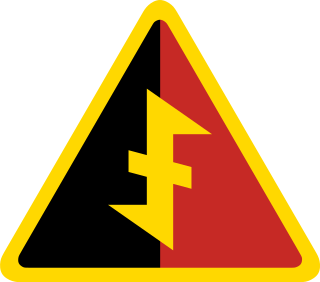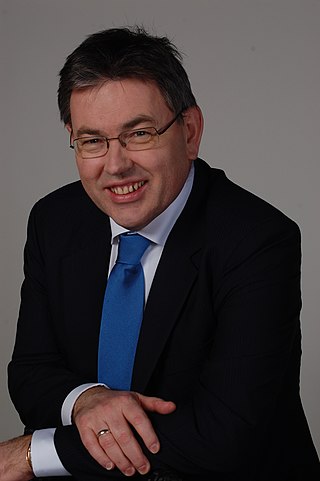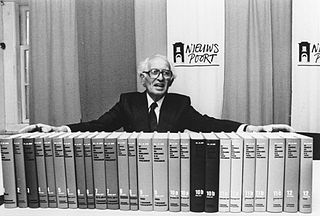Related Research Articles

The National Socialist Movement in the Netherlands was a Dutch fascist and later Nazi political organisation that eventually became a political party. As a parliamentary party participating in legislative elections, the NSB had some success during the 1930s. Under German occupation, it remained the only legal party in the Netherlands during most of the Second World War.

Anton Adriaan Mussert was a Dutch politician who co-founded the National Socialist Movement in the Netherlands (NSB) in 1931 and served as its leader until the party was banned in 1945. As such, he was the most prominent Dutch leader of the National Socialism movement before and during World War II. Mussert collaborated with the German occupation government, but was granted little actual power and held the nominal title of Leider van het Nederlandsche Volk from 1942 onwards. In May 1945, as the war came to an end in Europe, Mussert was captured and arrested by Allied forces. He was charged and convicted of treason, and was executed in 1946.

The NIOD Institute for War, Holocaust and Genocide Studies is an organisation in the Netherlands which maintains archives and carries out historical studies into the Second World War, the Holocaust and other genocides around the world, past and present. The institute was founded as a merger of the Netherlands Institute for War Documentation and the Center for Holocaust and Genocide Studies (CHGS).

The Vlaamsch Nationaal Verbond, widely known by its acronym VNV, was a Flemish nationalist political party active in Belgium between 1933 and 1945. It became the leading force of political collaboration in Flanders during the German occupation of Belgium in World War II. Authoritarian by inclination, the party advocated the creation of a "Greater Netherlands" (Dietsland) combining Flanders and the Netherlands.

Verdinaso, sometimes rendered as Dinaso, was a small fascist political movement active in Belgium and, to a lesser extent, the Netherlands between 1931 and 1941.

The National Socialist Dutch Workers Party was a minor Dutch Nazi party founded in 1931 and led by Ernst Herman van Rappard. Seeking to copy the fascism of others, notably Adolf Hitler, the group failed to achieve success and was accused by rivals such as the National Socialist Movement in the Netherlands (NSB) and the General Dutch Fascist League of being too moderate for a fascist movement.
The National European Social Movement was a Dutch neo-Nazi party, founded in 1953 as the political arm of the Stichting Oud Politieke Delinquenten, and disbanded by a ruling of the Dutch Supreme Court in 1955.
The Alliance for National Reconstruction was a conservative-nationalist political party in the Netherlands. The VNH played only a marginal role in the Dutch parliament.

George Wilhelm Kettmann or George Kettmann Jr. was a Dutch poet, writer, journalist, and publisher who promoted Nazism in the Netherlands. With his wife, he founded the best known Dutch Nazi publishing house, De Amsterdamsche Keurkamer. Until 1941 he was editor in chief of Volk en Vaderland, the weekly journal of the National Socialist Movement in the Netherlands (NSB), the movement of Anton Mussert.

Derk Jan Eppink is a Dutch journalist, politician in the Netherlands, and former cabinet secretary for European Commissioners Bolkestein (1999–2004) and Kallas (2004–2007). In 2009, he was elected to the European Parliament for List Dedecker, and in 2019 for Forum for Democracy. In 2021, he became an MP in the Dutch House of Representatives for the JA21 party, but in 2023 he switched to the Farmer-Citizen Movement.

The Reichskommissariat Niederlande was the civilian occupation regime set up by Germany in the German-occupied Netherlands during World War II. Its full title was the Reich Commissariat for the Occupied Dutch Territories. The administration was headed by Arthur Seyss-Inquart, formerly the last chancellor of Austria before initiating its annexation by Germany.

Henriette Nanette "Jetty" Paerl was a Dutch singer and resistance member of Jewish origin. She is known for being one of the Netherlands' representatives in the Eurovision Song Contest 1956 with the song "De vogels van Holland", and for being the first singer ever to perform in the Eurovision Song Contest.

The Kingdom of the Netherlands During World War II is the standard reference on the history of the Netherlands during World War II. The series was written by Loe de Jong (1914–2005), director of the Dutch Institute for War Documentation, and was published between 1969 and 1991. The series contains 14 volumes, published in 29 parts. De Jong was commissioned to write the work in 1955 by the Ministry of Education, Culture and Science. The first volume appeared in 1969, and de Jong wrote his last in 1988. The final volume, containing critique and responses, appeared in 1991.
Jan Aksel Wolthuis, a lawyer by training, was a Dutch Nazi who collaborated with the German occupiers during World War II and after the war was active in far-right politics.

Paul van Tienen was a Dutch Nazi during World War II and a far-right politician after the war, convicted at least twice for his political activities.
Jan Hartman (1887–1969) was a Dutch fascist and collaborator during World War II. After the war, he was active in far-right politics, and was one of the two founders of the Stichting Oud Politieke Delinquenten, a right-wing organization founded by and for formerly jailed and convicted war criminals and collaborators.

The Weerbaarheidsafdeling was the paramilitary arm of the National Socialist Movement in the Netherlands (NSB), the fascist political party that collaborated with the German occupiers of the Netherlands during World War II. The organization, roughly equivalent to the German SA, was founded in 1932 by Anton Mussert, co-founder of the NSB in 1931 and its leader until the end of the war. Members wore and marched in black uniforms and were thus called "blackshirts". In 1933 the Dutch government banned the wearing of uniforms, and the WA was disbanded in 1935 in order to forestall the Dutch government's banning it. In 1940, after the German invasion, the WA became openly active again, and more ruthless than before. They specialized in violent attacks, particularly on the Dutch Jewish population.

Adriaan Nicolaas Johan van Hees was a Dutch actor and member of the National Socialist Movement in the Netherlands (NSB). Van Hees was trained in Amsterdam and Germany, and spent a few years in theater and film. He quit professional acting to join the NSB, giving speeches and overseeing the organization's theater division, arguing that the change he thought necessary in Dutch drama had to come from political revolution. He became depressed and suicidal when he discovered he was part Jewish; still, he tried to join the SS but was denied. After the war, he was banned from the stage for ten years, and sentenced to five years in prison.
The Nederlandse Landwacht was a Dutch paramilitary organization founded by the German occupation forces in Holland on November 12, 1943. It should not be confused with the military volunteer corps 'Landwacht Nederland', which was established in March 1943 and renamed Landstorm Nederland in October, and which became part of the Waffen-SS.
References
- 1 2 Schans, Wil van der (2011-07-12). Monitor Racisme and Extremisme: Extreemrechts in Amsterdam. Amsterdam UP. p. 17. ISBN 9789085550495 . Retrieved 1 May 2012.
- 1 2 Art, David (2011-02-21). Inside the Radical Right: The Development of Anti-Immigrant Parties in Western Europe. Cambridge UP. p. 78. ISBN 9780521720328 . Retrieved 1 May 2012.
- 1 2 Roos, Jan de; Roos-Van Rooden, Thea (2010). Moed en overmoed: een biografie van burgemeester Dirk Frans Pont. Uitgeverij Verloren. pp. 193 n.14. ISBN 9789087041847 . Retrieved 1 May 2012.
- ↑ Geus, Machteld de (1995). "Vrederechtspraak in Nederland". In G. Aalders (ed.). Oorlogsdocumentatie '40-'45: zesde jaarboek van het Rijksinstituut voor Oorlogsdocumentatie. Zutphen: Walburg. pp. 48–86. ISBN 9789056120078.
- ↑ Venema, Derk (2007). Rechters in oorlogstijd: De confrontatie van de Nederlandse rechterlijke macht met nationaal-socialisme en bezetting (PDF). Nijmegen: Radboud University. p. 259.
- ↑ Venema, Derk (2003-03-20). "De bewaking van het recht tijdens de Duitse bezetting". In P. P. T. Bovend'Eert; L. E. de Groot-van Leeuwen; Thomas Johannes Marie Mertens (eds.). De Rechter bewaakt: over toezicht en rechters. Kluwer. pp. 207–30. ISBN 9789026840883 . Retrieved 2 May 2012.
- 1 2 Mudde, Cas (2003-02-22). The Ideology of the Extreme Right. Manchester UP. pp. 117–18. ISBN 9780719064463 . Retrieved 1 May 2012.